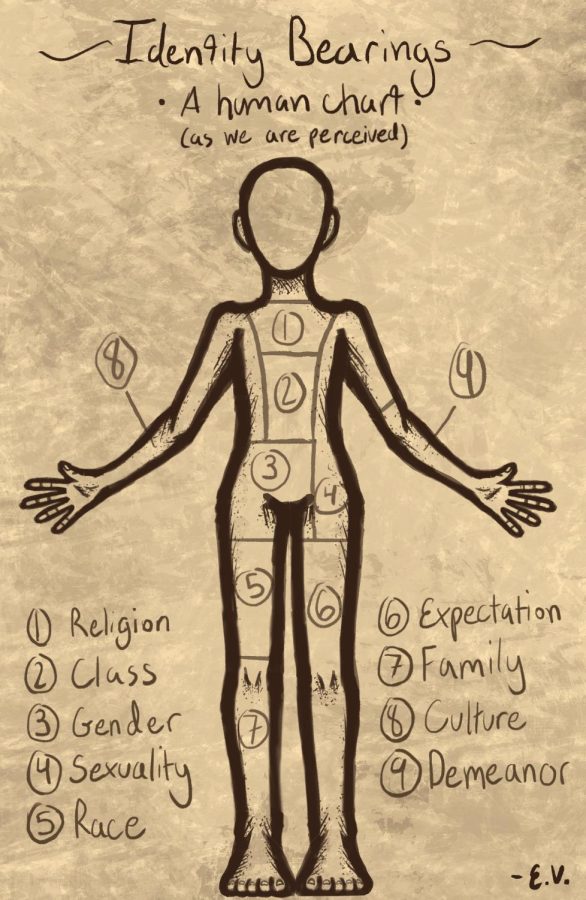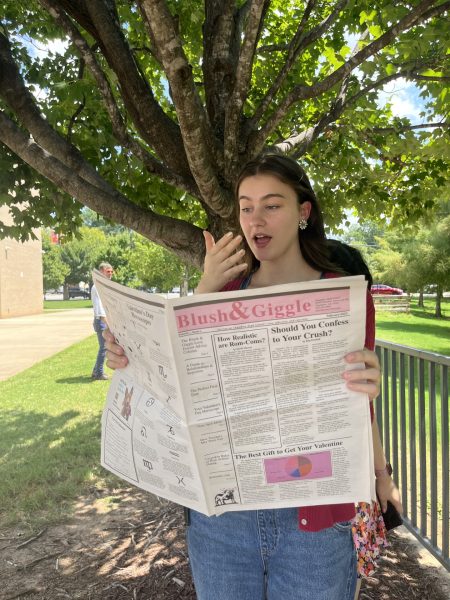Breaking the Binary: Trans and Non-binary Chamblee students
“This piece is based off of historic meat charts used by butchers, but applied onto the theme of human identity. It is a representation of how often people will pick and choose how they perceive and treat an individual based on certain characteristics they display or that people may assume about them (whether those assumptions are true or false), and how that ultimately dehumanizes the individual. Its focus is more on personal identities the world sees it, rather than how personal identity is processed internally.” -Elena Vega
December 16, 2021
This article can also be found in the exclusive December print edition focused on Chamblee’s Identity. Copies of the newspaper are being distributed at lunch Thursday, December 16.
Chamblee’s student body is very diverse, including numerous transgender (denoting or relating to a person whose sense of personal identity and gender does not correspond with their birth sex) and non-binary (someone who does not identify only as a man or a woman) students.
From freshman year to senior year, these students can look back at the lows and highs of being trans and non-binary inside the walls of Chamblee.
“The environment here is a little more diverse than most schools. It’s a lot more like accepting here as a whole. It’s like a party zone,” said Jas Lawrence (‘22) a non-binary student at Chamblee High School.
In addition, some have found safe spaces in clubs and extracurriculars.
“I think there are some spaces in Chamblee, which are very accepting, you know obviously GSA [Gender Sexuality Alliance], but like the band has been very accepting,” said Willow Kleinfelter (‘22) a transgender student at Chamblee.
Though there are students who disagree with these students’ identities at Chamblee, most trans or non-binary students avoid them, not causing any widely seen disputes.
“I am aware that there are transphobes at the school and I suspect there are quite a lot of them but I have not had to interact with a lot of them personally. […] It’s hard to say if the student body is very accepting or if I am good at avoiding people who would not be accepting,” said Kleinfelter.
A teacher’s attitude towards their students’ identities can be vital to creating a safe learning environment.
“From my experience, most teachers are very accepting and are open to hear what you have to say and meet your expectations. […] Almost every teacher asks for pronouns and for all of them that do, I would let them know mine and they were comfortable with it,” said Kieran Mayer (‘22) a transgender student at Chamblee.
By incorporating gender into class discussion, some teachers are attempting to make students more comfortable.
“I tend to talk about gender a lot in my classes, which includes all different levels of gender identity, so that there is sort of a dialogue about inclusion,” said Dr. Holly Isserstedt, an English Language Arts teacher at Chamblee.
Nevertheless, some teachers need time to understand the concept of trans or non-binary students.
“Instead of coming out by telling teachers, I just started writing my dead name and then in parentheses, my chosen name on papers, and I’m about to start switching to writing my chosen name and then in parentheses my dead name. […] Some of them came and specifically talked to me […], which I appreciated because frankly I did not want to talk to them about it but I didn’t mind them talking to me about it,” said Kleinfelter.
Allowing students to develop their own pace for coming out seems to be favored by the teachers.
“I feel that students will tell you as much as they want you to know. […] Sometimes it’s in the beginning of the school year surveys. Sometimes it’s in their writing. Sometimes it’s direct communication. Sometimes it’s communication that comes from the parents. So I think to a certain extent, staff members have to wait on that information so that we’re not making false assumptions,” said Isserstedt.
These magnet seniors report their teachers being very comfortable using select pronouns for students.
“Almost every teacher asks for pronouns and for all of them that do, I would let them know mine and they were comfortable with it. […] We got to have a conversation just to […] make sure I wasn’t getting misgendered or dead named. […] I think teachers are more accepting of dealing with things [than] counselors and administrators because you see your teachers all the time and they know who you are,” said Mayer.
As the school year continues, students develop an individual relationship with their teachers.
“We focus a lot on […] trying to get to know each student individually so that all students feel comfortable in our classes,” said Isserstedt, “I can only speak for myself, but I think having individual relationships with students and understanding their individual situations helps a lot to make students feel comfortable in class.”
As some teachers at Chamblee ask for pronouns as a courtesy at the beginning of the year, LGBTQIA+ students believe it needs to be a social standard for respect.
“I think it should be a standard for all teachers to ask, especially high schoolers, what their [students] pronouns are because we’re at the age where […] we’re figuring that stuff out. If we don’t hear […] the people who teach us […] respect our pronouns, it’s kind of like, do you have zero respect for me?” said Phinn Adams (‘22), a nonbinary student at Chamblee.
This can be most effective one-on-one or inside the classroom. “I think asking for pronouns are a good thing to do in each class rather than just as a school-wide thing because that information is disseminated a lot faster,” said Isserstedt. “If I have face-to-face contact with you and you have told me in class and we’re kind of going through the roster, […] I think that’s most helpful because then I immediately make a note of that and start making that change.”
Going through the paperwork on the administrative level can be more challenging.
“I have a lot of friends who have tried going through that process and the thing was they’ve all gotten almost different responses from it,” said Mayer. “I’ve heard it has [been] a very difficult process. Some people have told you how to get your parents to confirm it and then were like, ‘Oh no, I can just change that easily’. Like the nickname part that shows up on [Infinite] Campus. […] Some people have been trying to get that done for a couple months and [it] still hasn’t happened yet. So it’s definitely a rough process.”
Due to this rough accommodation process experienced by many, students have been hesitant to begin any processes that would lessen daily discomfort.
“I actually have been thinking about asking the administration for a gender-neutral bathroom, but I’ve kind of been thinking about that since like freshman year. Now that I’ve come out as non-binary, I feel like it’s more crucial to have a gender-neutral bathroom. It feels weird walking to a woman’s bathroom and like constantly thinking in my head, having to convince myself like, I’m not a girl. I’m not a girl. I’m just using the girl’s bathroom. I’m not a girl. It’s so weird,” said Lawrence.
Though students can apply for accommodations with the counselors.
“Accommodations are individualized based on student’s needs and documentation provided,” said Chamblee High School Counselor, Tinikia Jones.
Those who attempt to go through the process and get accommodations are not guaranteed a change.
“I still use the girl’s restroom because I kind of have to, I’m not allowed to use the guys. I tried to get accommodations, we spent like four months last year, with my parents […] trying to get them to at least change my name in the system, not even to Kieran but at least to not my legal name. And [we were] met with no luck. We had different people who would give us multiple different stories. First, they say we can change it, and then they say we couldn’t,” said Mayer.
The immense wait times and inconsistencies in the counseling department might be a result of poor communication.
“[We] counsel students, talk to teachers and administration on behalf of students, educate teachers and administration, advocate for students, etc. This year it’s been a bit of a challenge because we haven’t really met as a faculty to discuss yet,” said Jones.
The use of unisex bathrooms are available to students upon request of the administration, according to the counseling department, though they were unable to comment any further. Unisex bathrooms aren’t the only accommodations non-binary and trans students want at Chamblee.
“My dead name bothers me. […] I have had some adventures figuring out […] which things I can sign up with my chosen name and which things I need to sign up with my legal name. If they’re going to send a form to the school or for scholarship-related things, I’ll have to use my legal name, but for things like signing up for events that are done through clubs, I can use my chosen name,” said Kleinfelter.
Seeing their deadname in school databases can be a daily reminder of who they are not.
“Every time I go into Google Classroom or Infinite Campus, I have to see that name. And there’s almost nothing that can be done about it, at least that has been told to me and it’s just hard to deal with because it’s a constant reminder,” said Mayer.
Though names in Infinite Campus can be hard to navigate or change as it is part of a larger database.
“Infinite Campus must list student names as indicated on their birth certificates. It can only be changed if a student/parent completes a legal name change,” said Jones.
LGBTQIA+ Chamblee students want more changes to make their learning environment comfortable.
“I just think that your name is one of the biggest aspects of who a person is in their identity. It’s very important that we do as much as we can to make that accommodation,” said Mayer.
Through students’ requests and complaints, the Chamblee counseling department seems to be aware that there are improvements to be made.
“I think the best way for us to know that is for students to tell us what they need and we try to meet their needs. We can do a better job of letting students know we are available and that we do much more than scheduling,” said Jones.











